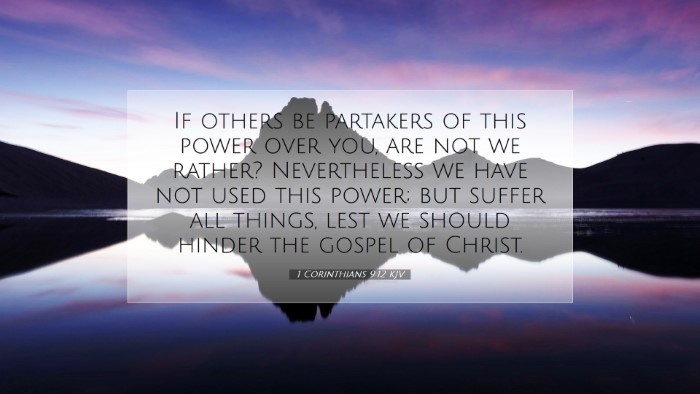Commentary on 1 Corinthians 9:12
Verse: 1 Corinthians 9:12
"If others be partakers of this power over you, are not we rather? Nevertheless, we have not used this power; but suffer all things, lest we should hinder the gospel of Christ."
Introduction
In 1 Corinthians 9:12, the Apostle Paul articulates a crucial aspect of his ministry and the principles of Christian liberty. Paul is responding to the underlying question of rights and privileges within the context of the church. His discourse serves as a means to address not only his authority as an apostle but also the greater principle of love that undergirds Christian service.
Contextual Background
This verse occurs in a chapter where Paul defends his apostolic authority against the backdrop of challenges from both insiders and outsiders. The Corinthian church was rife with divisions and disputes concerning leadership and authority. Paul emphasizes that while he possesses rights as an apostle, he chooses to forego them for the sake of the gospel.
Commentary Insights
Matthew Henry's Commentary
Matthew Henry emphasizes the irony in the situation where others are enjoying their rights, even at the expense of the gospel. He notes that Paul’s refusal to exercise his rights is borne out of a desire to not hinder the spread of the gospel. Henry points out that Paul’s humility, and his willingness to endure hardship, exemplifies the self-denying nature of true Christian service.
Albert Barnes' Notes
Albert Barnes elaborates on the “power” that leaders in the church possess. The term "power" refers to the rights and privileges that accompany their role. Barnes argues that while Paul could demand financial support and recognition, he prioritizes the gospel mission above all. He postulates that the act of suffering and enduring hardship serves a greater purpose – to ensure that the message of Christ is not marred by issues of financial support or personal gain.
Adam Clarke's Commentary
Adam Clarke provides a robust analysis of the concept of liberty as it pertains to Christian leaders. He comments on the tension between rights and responsibilities, noting that true ministry often requires sacrifice. Clarke highlights that Paul’s example teaches believers that the effective proclamation of the gospel may indeed demand personal sacrifice and that the greater good should always take precedence over individual rights.
Theological Implications
- Self-Denial: The act of denying oneself for the sake of others is a core teaching of Christ, which Paul fully embodies.
- Integrity of the Gospel: The integrity of the message must never be compromised by the claims of entitlement.
- Leadership and Sacrifice: Leaders in the church must model sacrificial leadership, prioritizing the mission over personal gain.
- You Are Not Alone: Even in suffering and denial of rights, leaders are not without support; they are part of a greater community in Christ.
Practical Applications
For pastors, students, and scholars, the truths within this verse encourage critical reflection on personal motives in ministry. The lessons learned from Paul's approach can translate into practical ministry applications for today’s church leaders:
-
Evaluate Personal Rights: Consider the rights you may feel entitled to and reflect on how exercising them might affect the broader mission of the gospel.
-
Embrace Sacrificial Leadership: Look for opportunities to serve others, even at a personal cost, as a testament to Christ’s love.
-
Focus on the Gospel: Ensure that all actions and decisions made in ministry contribute positively to the advancement of the gospel rather than detract from it.
-
Be a Model of Humility: Demonstrate that true power comes from humility and service, not from exercising rights.
Conclusion
1 Corinthians 9:12 encapsulates the heart of Christian leadership and the essence of the gospel mission. Paul’s choice to forgo his rights for the sake of others remains a powerful testament of the depth of love and selflessness that Jesus calls his followers to embody. These insights invite reflection on one’s approach to ministry and the willingness to prioritize the gospel over personal preferences.


